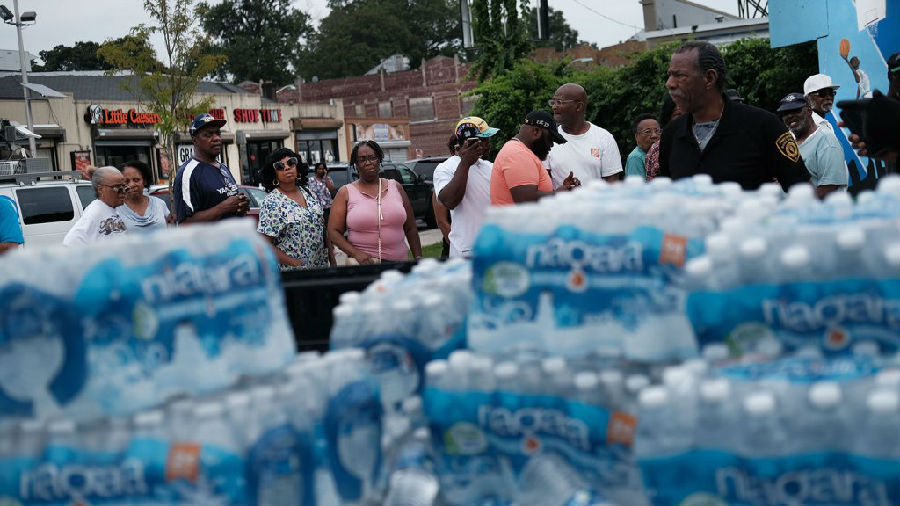United States
美国版块
Water
水
With the lead piping
使用铅水管
Millions of Americans still get their drinking water from lead pipes
数百万美国人仍然通过铅水管获得饮用水
Over a century has passed since the dangers of consuming lead became widely known. Ingesting even small quantities damages young brains and may raise the risk of heart problems. Yet residents of Chicago—and many other cities—still mostly swig from taps fed by lead pipes. About 400,000 lead service lines connect to the mains in the Windy City, linking about four in five of all houses there. One study of nearly 3,000 homes, two years ago, found two-thirds had elevated levels of lead in their water.
一个多世纪以来,摄入铅的危险已经广为人知。即使少量摄入也会损害年轻人的大脑,并可能增加心脏问题的风险。然而,芝加哥和许多其他城市的居民仍然主要是从铅水管连接的水龙头中喝水。风城大约有40万条含铅服务线路连接着城市的主干线,连接着大约五分之四的房屋。两年前,一项对近3000户家庭的研究发现,芝加哥三分之二家庭的水中铅含量升高。
In Chicago some residents are told to flush their taps before drinking, to fit filters or avoid boiled water (doing so can concentrate higher levels of lead). Older houses in poorer districts may be worst affected. Since this problem has been identified for so long,why does it persist? The city’s water woes can be blamed in part on the historic clout of industrial lobbyists and a union of plumbers. In the last century, even as other cities stopped installing the pipes or started removing them, they nudged Chicago’s political bosses to set rules making lead pipes compulsory. That lasted until a federal ban on new lead pipes in 1986. More than three decades on, Lori Lightfoot recently became the first mayor to set out a plan to fix things. The catch? It will cost $8.5bn, which the city government does not have. At the current pace of replacing fewer than 800 pipes a year, notes an alderman, residents won’t all get lead-free water until the mid-26th century.
芝加哥政府告知部分居民在饮用前冲洗水龙头,安装过滤器或避免使用开水(这样做会使铅浓度更高)。贫困地区的老房子可能受影响最为严重。既然这个问题已经被发现这么久了,为什么还会一直存在?芝加哥的水资源问题可以部分归咎于工业游说人员和水管工人联合会的历史影响力。上个世纪,就在其他城市停止安装或开始拆除铅水管时,他们敦促芝加哥的政治领袖们制定规定强制使用铅水管。这一规定一直持续到1986年,联邦政府禁止新安装铅水管。三十多年过去了,洛里·莱特福特最近成为第一位提出计划以解决饮用水含铅问题的市长。该计划有什么隐情?这项计划将耗资85亿美元,而市政府却没有这么多资金。一位市议员指出,按照目前每年更换不到800根铅水管的速度,居民们要到26世纪中叶才能全部获得无铅水。

Mayors are more alert to the problem these days, especially since the water crisis in 2014 in Flint, Michigan exposed residents to high levels of lead leaching from their pipes. Flint is spending $100m upgrading its system. Erik Olson of the Natural Resources Defence Council, who has campaigned on the issue for 30 years, says thousands of water systems across the country, serving tens of millions of people, still face “serious problems”. The new attention to the problem encourages him.
如今,市长们对这一问题更加警惕,特别是密歇根州弗林特市在2014年曾爆发一次饮水危机,使居民们被迫使用水管中铅含量超标的水。弗林特市花费1亿美元升级其用水系统。自然资源保护委员会的埃里克•奥尔森30年来一直在领导运动致力于解决这一问题,他说,美国数以千计的供水系统服务着数千万美国人,但该系统仍然面临“严重的问题”。政府对用水问题的重新关注鼓励了他。
译文由可可原创,仅供学习交流使用,未经许可请勿转载。












